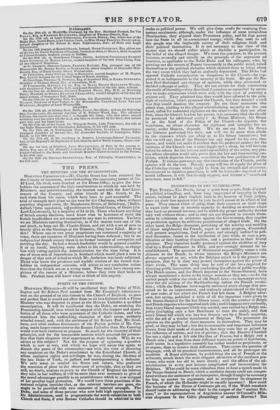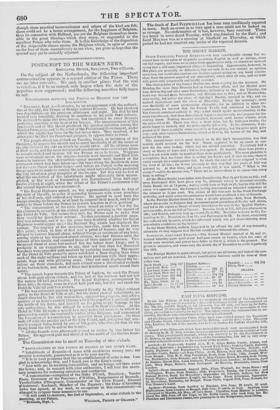DISCONTENTS IN THE NF.TITERLANDS.
THE Traits—The Dutch, being a quiet busy people, little disposed to political wrangling, and, from long experience of integrity in their courts, inclined to place implicit faith in the honesty of their judges, have set their face against trial by jory in civil causes or in affairs of the press. They cannot think of going from their counters or their shops to waste their time or exercise sagacity in deciding on matters where they have no personal interest, and in which the proper authority decides very well without them ; and as they are not disposed to commit them- selves by criticisms or strictures against the Government, they require no protection against its arbitrary punishment of alleged libels. On the other hand, the Belgic character, partaking of the activity and mobility of (their neighbours) the French, eager to make progress, dissatisfied with present acquisitions, fond of power, and strongly inclined to poli- tical discussion, found in the institution of jury trials, at once a gra- tification of their bustling disposition, and a protection to their liberal opinions. They therefore loudly protested against the abolition of jury trial by a Royal ordinance in 1815, and now strongly demand its re- establishment. The question of Ministerial responsibility seems a vain chimera to the Dutch, in whose interests the King's Ministers are always supposed to act, while the Belgians attach to it the greater im- portance, that by it they may protect themselves against the power of their rivals. The same thing may be said of the laws required for directing public instruction, and conducting the affairs of public worship. The Dutch nation, and the Dutch deputies in the States-General, have always manifested a desire to let things remain as they are,—to fix the united people within the circle of old Dutch laws,—to stereotype society after the old edition of the Stadtholdership before the French revolu- tion ; while the Belgians have eagerly embraced every change that pro- mised to be an improvement, and zealously administered to the legacy of new codes of law which the French had left them. A Belgian advo- cate, last spring, published a table of all the important votes given in the States-General for the last fifteen years, with the number of Belgic and Dutch deputies who supported each side; and it happens very curiously, that every liberal measure which was carried, was carried by a Belgic ma- jority (including only a few Dutchmen to turn the scale), and that every liberal bill which was lost was thrown out by a Dutch majority, with the aid of a similar detachment of Belgians. We pronounce no opinion on the quality of these measures in themselves. They may be good, or they may be bad ; but the incontestable and important inference drawn from their mode of disposal is, that they were lost or gained by the influence of nations, and not of parties ; that the Elective Chamber has not a right and a left side like that of France, but a Belgic and a Dutch side ; and that from their different tastes on points of legislation, their union in a legislative assembly has rather tended to perpetuate, or to expose, than to remove their differences. Then comes the question of language, with all its practical inconvenience, and all its grotesque ab- surdities. A Royal ordinance, by prohibiting the use of French at the tribunals, struck dumb the most eloquent advocates of the southern pro- vinces, who were too old to learn Dutch ; and the affairs of the ad- ministration in every part became complicated and inconvenient for Belgians. What could be more ridiculous than to hear a speech made in the States-General in Dutch, which a southern deputy could not compre- hend without the assistance of an interpreter, though it might be necessary for him to answer its arguments and to overpower its eloquence in French, of which the Hollander might be equally ignorant ? How could
the business of the House of Commons get on, if the Welsh members should insist on addressing the chair in the tongue of the "ancient Bri- tons," or the representatives of Argyleshire answer O'Connell's Mile- sian eloquence in the Celtic *phraseology of ancient Morven? But
though these practical inconveniences and others of the kind are felt, there could not be a better arrangement, for the happiness of Belgium, than its connexion with Holland, nor are the Belgians themselves insen- sible to the great blessings which they enjoy, or ungrateful to the excellent Prince who rules them. It is this knowledge of the disposition of the respectable classes among the Belgians which, in spite of events on the face of them contradictory to our view, yet gives us hope that the quarrel may yet be amicably adjusted.



























 Previous page
Previous page